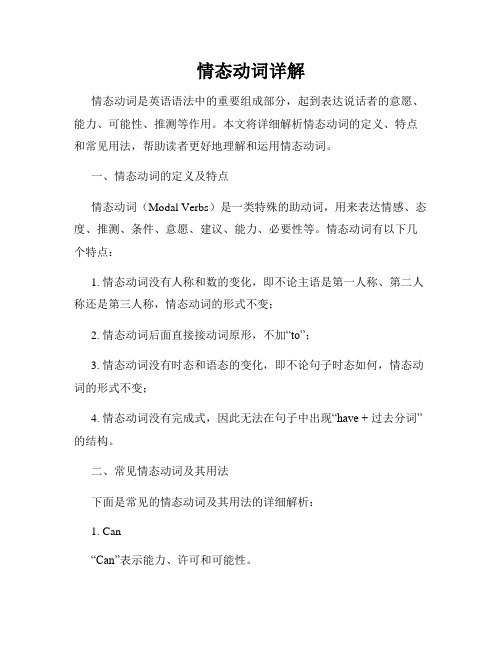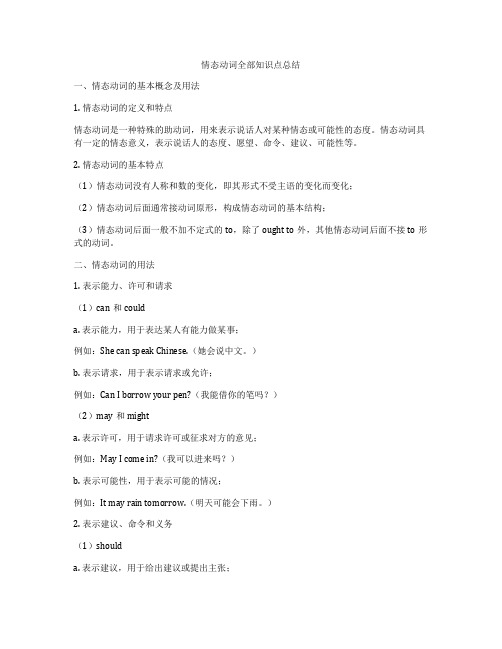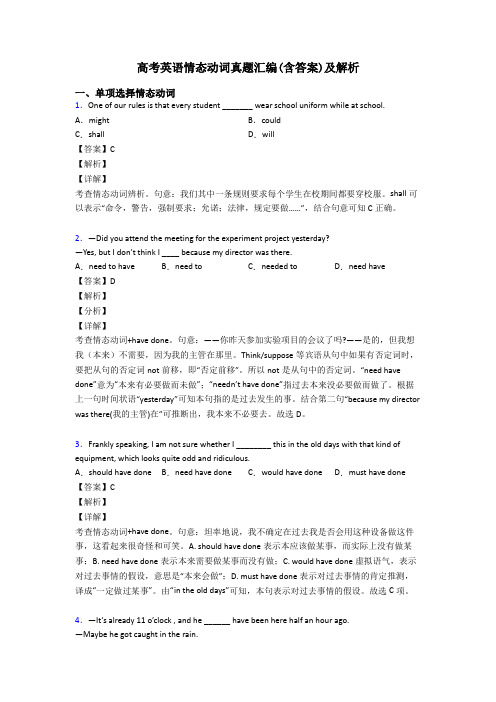语法知识—情态动词的全集汇编含解析
情态动词详解

情态动词详解情态动词是英语语法中的重要组成部分,起到表达说话者的意愿、能力、可能性、推测等作用。
本文将详细解析情态动词的定义、特点和常见用法,帮助读者更好地理解和运用情态动词。
一、情态动词的定义及特点情态动词(Modal Verbs)是一类特殊的助动词,用来表达情感、态度、推测、条件、意愿、建议、能力、必要性等。
情态动词有以下几个特点:1. 情态动词没有人称和数的变化,即不论主语是第一人称、第二人称还是第三人称,情态动词的形式不变;2. 情态动词后面直接接动词原形,不加“to”;3. 情态动词没有时态和语态的变化,即不论句子时态如何,情态动词的形式不变;4. 情态动词没有完成式,因此无法在句子中出现“have + 过去分词”的结构。
二、常见情态动词及其用法下面是常见的情态动词及其用法的详细解析:1. Can“Can”表示能力、许可和可能性。
能力:用于表达某人在某方面具有的能力或技能。
例句:He can speak three languages.许可:用于征求或给予许可。
例句:Can I borrow your pen, please?可能性:用于表达可能发生的情况。
例句:It can rain tomorrow.2. Could“Could”是Can的过去式,表示过去或虚拟条件下的能力、许可和可能性。
能力(过去):用于表达过去具备的能力或技能。
例句:When I was young, I could run very fast.许可(过去):用于过去征求或给予许可。
例句:Could I use your phone yesterday?可能性(虚拟条件):用于表示虚拟情况下的可能性。
例句:If I had enough money, I could travel around the world.3. May“May”表示允许、可能性、祝愿和推测。
允许:用于征求或给予许可。
例句:May I come in?可能性:用于表达主观推测的可能性。
(完整)情态动词专题讲解

(完整)情态动词专题讲解情态助动词专题训练概说助动词(auxiliary)主要有两类:基本助动词(primary auxiliary)和情态助动词(modal auxiliary)。
基本助动词有三个:do, have和be;情态助动词有十三个:may, might; can, could; will, would; shall, should; must, need, dare, used to, ought to。
上述两类助动词的共同特征是,在协助主动词构成限定动词词组时,具有作用词的功能:1)构成否定式:He didn’t go and neither did she.The meeting might not start until 5 o'clock。
2) 构成疑问式或附加疑问式:Must you leave right now?You have been learning French for 5 years, haven’t you?3) 构成修辞倒装:Nowhere can he obtain any information about his sister。
Hardly had he arrived when she started complaining.4)代替限定动词词组:A: Who can solve this crossword puzzle?B: Tom can.A: Shall I write to him?B: Yes, do.情态助动词的特征基本助动词与情态助动词最主要的区别之一是,基本助动词本身没有词义,而情态助动词则有自己的词义,能表示说话人对有关动作或状态的看法,或表示主观设想:What have you been doing since?(构成完成进行体,本身无词义)I am afraid I must be going. (一定要)You may have read some account of the matter. (或许已经)除此之外,情态助动词还有如下词法和句法特征:1)除ought和used以外,其他情态动词后面只能接不带to的不定式。
人教版英语英语情态动词完整归纳含答案解析百度文库

人教版英语英语情态动词完整归纳含答案解析百度文库一、初中英语情态动词1.— We've ordered too much food. I eat any more.—Never mind. Let' take it home.A. can'tB. mustn'tC. needn'tD. shouldn't【答案】 A【解析】【分析】句意:——我们已经点了太多的食物,我不能再吃了。
——没关系,我们带回家吧。
can't不能;mustn't必须不;一定不要;needn't不必;shouldn't不应该。
根据句意可知选A。
【点评】考查情态动词辨析。
2.—Where is Monica? I can't find her anywhere.—She be in the library. She loves reading books when she is free.A. mustB. needC. can't【答案】 A【解析】【分析】句意:——莫妮卡在哪?我到处都找不到她。
——她肯定在图书馆,她喜欢空闲时看书。
A肯定,肯定句中表示推测,B需要,C不可能,否定句中表示推测,根据 She loves reading books when she is free ,可知是肯定句表示推测,故选A。
【点评】考查情态动词,注意情态动词表推测的用法。
3.— __________I wear a tie to Janet's birthday party?— No,you needn't. But do remember to bring her a present.A. MustB. ShouldC. NeedD. Can【答案】 A【解析】【分析】句意:——我必须戴领带去参加Jane的生日聚会吗?——不,你不必,但是记住给她带个礼物。
小学中的常见情态动词知识点的归纳与解析

小学中的常见情态动词知识点的归纳与解析情态动词在英语语法中起着非常重要的作用。
对于小学生来说,了解和正确使用常见的情态动词是构建良好语言基础的关键。
本文将对小学中的常见情态动词知识点进行归纳与解析,帮助学生更好地掌握这些语法要点。
一、常见的情态动词1. can:表示能力、许可或可能性。
例如:I can swim.(我会游泳。
)2. could:表示过去的能力、许可或可能性。
例如:When I was young, I could run very fast.(当我年轻时,我能跑得很快。
)3. may:表示许可或可能性。
例如:May I go to the bathroom?(我可以去洗手间吗?)4. might:表示过去或将来某个时间的可能性。
例如:He might come to the party tomorrow.(明天他可能会来参加晚会。
)5. shall:表示应该或将要发生的事情。
例如:Shall we go to the park tomorrow?(我们明天去公园好吗?)6. should:表示应该做的事情。
例如:You should eat fruits and vegetables every day.(你每天应该吃水果和蔬菜。
)7. will:表示将要发生的事情或意愿。
例如:I will help you withyour homework.(我会帮你做作业。
)8. would:表示过去的意愿、习惯或建议。
例如:When I was a child,I would always play with my friends.(当我还是个孩子时,我总是和朋友们一起玩。
)9. must:表示必须或对某种情况的肯定。
例如:You must finish your homework before watching TV.(你必须先完成作业再看电视。
)10. ought to:表示应该或理应做的事情。
情态动词全部知识点总结

情态动词全部知识点总结一、情态动词的基本概念及用法1. 情态动词的定义和特点情态动词是一种特殊的助动词,用来表示说话人对某种情态或可能性的态度。
情态动词具有一定的情态意义,表示说话人的态度、愿望、命令、建议、可能性等。
2. 情态动词的基本特点(1)情态动词没有人称和数的变化,即其形式不受主语的变化而变化;(2)情态动词后面通常接动词原形,构成情态动词的基本结构;(3)情态动词后面一般不加不定式的to,除了ought to外,其他情态动词后面不接to形式的动词。
二、情态动词的用法1. 表示能力、许可和请求(1)can和coulda. 表示能力,用于表达某人有能力做某事;例如:She can speak Chinese.(她会说中文。
)b. 表示请求,用于表示请求或允许;例如:Can I borrow your pen?(我能借你的笔吗?)(2)may和mighta. 表示许可,用于请求许可或征求对方的意见;例如:May I come in?(我可以进来吗?)b. 表示可能性,用于表示可能的情况;例如:It may rain tomorrow.(明天可能会下雨。
)2. 表示建议、命令和义务(1)shoulda. 表示建议,用于给出建议或提出主张;例如:You should see a doctor.(你应该去看医生。
)b. 表示义务,用于表示责任或义务;例如:We should obey the law.(我们应该遵守法律。
)(2)ought toa. 表示责任或义务,用于表示应该做的事情;例如:You ought to apologize to her.(你应该向她道歉。
)3. 表示可能性和必然性(1)musta. 表示必然性,用于表示肯定的推断或必然的结论;例如:He must be at home now.(他现在一定在家。
)b. 表示义务,用于表示应遵守的规定或责任;例如:Students must wear school uniforms.(学生必须穿校服。
高考英语情态动词真题汇编(含答案)及解析

高考英语情态动词真题汇编(含答案)及解析一、单项选择情态动词1.One of our rules is that every student _______ wear school uniform while at school. A.might B.couldC.shall D.will【答案】C【解析】【详解】考查情态动词辨析。
句意:我们其中一条规则要求每个学生在校期间都要穿校服。
shall可以表示“命令,警告,强制要求;允诺;法律,规定要做……”,结合句意可知C正确。
2.—Did you attend the meeting for the experiment project yesterday?—Yes, but I don’t think I ____ because my director was there.A.need to have B.need to C.needed to D.need have【答案】D【解析】【分析】【详解】考查情态动词+have done。
句意:——你昨天参加实验项目的会议了吗?——是的,但我想我(本来)不需要,因为我的主管在那里。
Think/suppose等宾语从句中如果有否定词时,要把从句的否定词not前移,即“否定前移”。
所以not是从句中的否定词。
“need have done”意为“本来有必要做而未做”;“needn’t have done”指过去本来没必要做而做了。
根据上一句时间状语“yesterday”可知本句指的是过去发生的事。
结合第二句“because my director was there(我的主管)在”可推断出,我本来不必要去。
故选D。
3.Frankly speaking, I am not sure whether I ________ this in the old days with that kind of equipment, which looks quite odd and ridiculous.A.should have done B.need have done C.would have done D.must have done 【答案】C【解析】【详解】考查情态动词+have done。
情态动词的用法总结及例句解析
情态动词的用法总结及例句解析情态动词是英语中常用的一类动词,用来表示说话人的态度、情绪、推测、能力等。
它在句子中通常与动词原形搭配使用,起到强调、修饰或者推测的作用。
本文将对情态动词的用法进行总结,并通过例句解析来帮助读者更好地理解。
一、情态动词的基本用法情态动词通常没有人称和数的变化,也没有时态的变化,后面接动词原形。
有以下几种情态动词:can,could,may,might,shall,should,will,would,must,ought to等。
1. 表示能力或可能性- I can swim.(我会游泳。
)- He may come to the party.(他可能会来参加派对。
)2. 表示允许或禁止- You may go now.(你现在可以走了。
)- You must not smoke here.(你不能在这里抽烟。
)3. 表示建议或命令- You should take a break.(你应该休息一下。
)- You ought to apologize to him.(你应该向他道歉。
)4. 表示推测或猜测- He could be there.(他可能在那里。
)- It might rain tomorrow.(明天可能会下雨。
)5. 表示义务或必须- We must finish the project on time.(我们必须按时完成这个项目。
)- You ought to help him.(你应该帮助他。
)二、情态动词的细分用法除了以上的基本用法外,情态动词还有一些特殊的用法,需要注意其具体含义和用法。
1. can 和 could- 表示能力和技能:I can play the piano.(我会弹钢琴。
)- 表示请求或许可:Can I use your computer?(我可以用你的电脑吗?)- could 还可以用来表示过去的能力或许可:When I was young, I could run very fast.(小时候,我跑得很快。
英语情态动词用法的完整总结与解释
英语情态动词用法的完整总结与解释情态动词是英语中具有独特功能的一类动词,它们可以用来表达说话者对说话内容的态度、看法、意愿等。
在日常英语交流中,情态动词的使用频率很高,掌握好情态动词的用法是提高英语交流能力的重要一步。
下面是英语情态动词的用法总结:情态动词的基本概念情态动词是一类特殊的助动词,可以用来表示说话人对某种事情的判断、态度、建议、推测、命令等语气。
它们和其他动词不同,没有人称和数的变化,也没有时态。
英语中常用的情态动词有:can, could, may, might, will, would, shall, should, ought to, must等。
情态动词的用法1. 表示能力、许可和请求- can和could表示能力,能够做某事。
- He can swim.(他会游泳。
)- may和might表示许可,允许或请求。
- May I use your pen?(我能用你的笔吗?)- would you mind和could you possibly表示请求,请求对方做某事。
- Would you mind closing the window?(你能帮我关一下窗户吗?)2. 表示推测、可能性和相信- may和might表示推测或可能性。
- I may be late for the meeting.(我可能会迟到开会。
)- must表示非常肯定或有把握。
- It must be cold outside.(外面一定很冷。
)3. 表示建议和义务- should和ought to表示应该,有义务。
- We should wash our hands before meals.(我们应该饭前洗手。
)- had better和would rather表示建议。
- You had better hurry up.(你最好快点。
)4. 表示命令和禁止- will和shall表示命令。
- You will leave a message.(你必须留言。
高考英语情态动词知识点真题汇编含答案解析(1)
高考英语情态动词知识点真题汇编含答案解析(1)一、选择题1.Although you ______ find bargains in London, it’s not generally a cheap place to shop. A.should B.need C.must D.can2.Tourists who enter the quiet area _____ obey the rule to reduce any potential effect on the environment.A.can B.may C.shall D.dare3.—Can I pay the bill by check?—Sorry,sir.But it is the management rules of our hotel that payment _____ be made in cash.A.shall B.needC.will D.can4.—What do you think of your boss?—He is easy-going most of the time, but sometimes he ________ be hard on us.A.should B.might C.can D.must5.You ______ feel all the training a waste of time, but I'm a hundred percent sure later you'll be grateful you did it.A.may B.can C.should D.would6.They worked hard day and night during the next ten years ________ they ________ pay for the lost necklace.A.so…would B.so that…would C.in order that…could D.and…would 7.—Where is my dictionary?I remember I put it here yesterday.—You___it in the wrong place.A.must put B.should have putC.might put D.might have put8.For all of the diligent students here, I give you my promise: Work hard, and you ________ be rewarded!A.can B.need C.shall D.could 9.According to the regulations, anyone who has the intention to be a teacher _______ pass a series of demanding tests.A.can B.would C.might D.shall10.—It’s so hot and uncomfortable here! Why are your windows still closed?—Oh, I’m not to blame. They ________ open.A.shan’t B.mustn’t C.won’t D.wouldn’t 11.You ______ have carried all these parcels yourself. The shop would have delivered them if you had asked them.A.may not B.needn't C.can't D.mustn't12.—I can’t think why he________ so angry. I mean no harm.—It’s typical of him to be sensitive(敏感的).A.should have been B.must have beenC.might have been D.can have been13.Hurry up! Tom _______ for us at the gate.A.must wait B.must be waitingC.can be waiting D.must have waited14.It was so noisy that we hear ourselves speak.A.couldn’t B.shouldn’tC.mustn’t D.needn’t15.Mary is a bit shy and ____ a speech in public, which makes her lose the precious chance to do the voluntary job.A.dares not make B.doesn’t dare makeC.dare not to make D.dares not to make16.—I phoned you yesterday morning. A girl answered, but I didn’t recognize the voice.—Oh, it ________ my younger sister. She was in my room at that moment.A.must have been B.should have beenC.could have been D.may have been17.You ______ have been out last night, for all the lights in your room were not on.A.need B.must C.may D.should18.I still remember my happy childhood when my mother ___________ take me to Disneyland at weekends.A.might B.mustC.would D.should19.—I’m sorry, I ________ have been so rude to you that way.—Forget it, but I was a bit out of control yesterday.A.mustn’t B.shouldn’tC.couldn’t D.needn’t20.—Do you know where David is? I couldn’t find him anywhere.— Well. He ________ have gone far — his coat is still here.A.shouldn’t B.mustn’t C.can’t D.wouldn’t 21.The lady ________ have done something wrong, because she is looking guilty.A.would B.should C.can D.must22.The girl _________ out alone at night.A.dare not go B.dare not to go C.dares not go D.not dare go23.I _________ my driving test but I didn’t operate carefully.A.should pass B.may passC.might have passed D.might pass24.—Sorry, Mum! I failed the job interview again.—Oh, it's too bad. You________ have made full preparations.A.must B.can C.would D.should25.—I heard they went skiing in the mountains last winter.—It true because there was little snow there.A.may be not B.won’t be C.couldn’t be D.mustn’t be【参考答案】***试卷处理标记,请不要删除一、选择题1.D解析:D【解析】【分析】【详解】考查情态动词辨析。
高考英语情态动词真题汇编(含答案)及解析
高考英语情态动词真题汇编(含答案)及解析考查情态动词+have done。
句意:坦白地说,我不确定我过去是否需要用那种看起来很奇怪、很荒谬的设备做过这件事。
根据句意可知,这件事过去已经发生,而且自己不确定是否需要做,故应使用“___’t have done”,表示过去本来没必要做而做了。
所以选C。
A.should have done表示“本应该做而没做”;B.need have done表示“本来没有必要做但是做了”;C.___’t have done表示“本来没必要做但是做了”;D.must have done表示“一定做了”。
根据句意可知选C。
二、完形填空情态动词4.(2019·全国卷Ⅲ)I’m going to the supermarket。
Do you want me to buy you anything?I’m good。
thanks,” my friend replied。
“But could you possibly pick up some milk for me?”Sure,” I said。
“___1___ kind would you like?”Oh。
___2___ you。
I’ll take whatever you get.” she said.I ___3___ the supermarket and picked up a gallon of milk。
When I got to the checkout。
I ___4___ that the line was long and there was only one cashier working。
I ___5___ my head and sighed。
___6___ that it was going to take a while.Just as I was about to ___7___ the line。
- 1、下载文档前请自行甄别文档内容的完整性,平台不提供额外的编辑、内容补充、找答案等附加服务。
- 2、"仅部分预览"的文档,不可在线预览部分如存在完整性等问题,可反馈申请退款(可完整预览的文档不适用该条件!)。
- 3、如文档侵犯您的权益,请联系客服反馈,我们会尽快为您处理(人工客服工作时间:9:00-18:30)。
一、选择题1.—Jenny, we buy Mom presents. We can clean the house from top to bottom.—Good idea! It’s a special present for Mother’s Day.A.can’t B.mustn’tC.shouldn’t D.needn’t2.(2018·山东临沂) Could you please speak a little louder? I ______ hear you very well. A.can’t B.mustn’tC.shouldn’t D.needn’t3.— Do you think it is safe to shop online?— I think so. On Taobao, customers return goods with no questions asked,but they ______ pay delivery costs.A.can’t; can B.must; must C.can; have to D.mustn’t; can 4.—Is Wendy in the classroom now?—I’m not sure. She ________ be there. I saw her in the library ten minutes ago.A.may not B.must not C.shall not D.would not 5.—Is that cap Bob’s?—No, it ________ be his. His is blue.A.can’t B.mustn’t C.needn’t D.may not6.A: Is Jim coming by train?B: I’m not sure. He _______ drive his car.A.must B.may C.need D.should7.—I can't stop smoking, doctor.—For your health, I'm afraid you ________.A.must B.can C.may D.need 8.—Sorry, Ms Wang. I left my homework at home. Must I hand it in today?—No, you_______ . You_______ bring it here tomorrow.A.mustn’t; should B.needn’t; must C.mustn’t; may D.needn’t; can9.I see the blackboard. I need to have my glasses.A.can B.can’t C.must D.mustn’t 10.You run with the train when it is coming. It’s dangerous.A.may not B.mustn’t C.needn’t11.—Look! Mrs. Smith is standing in front of the teaching building.—It______ her. She has gone to Egypt for her holiday.A.must be B.mustn’t be C.can be D.can’t be12.---You look very pretty, if I say so.---Thanks a lot for saying that.A.must B.may C.will D.have to13.-Could you help me with my English homework, Nancy?-Of course I____________. Glad to help.A.could B.can C.must D.do14.One ______ easily lose his way when he visits or comes to a new place.A.may B.must C.need D.should 15.—Must I start now?—No, you_______________.A.mustn't B.can't C.needn't D.must16.— Must I finish the homework now?— .You can do it later.A.No, you needn’t B.Yes, you must C.No, you can’t 17.When I write down what I am showing thanks to, it’s always for things that money______buy.A.needn’t B.shouldn’t C.may not D.can’t18.— Will Jim come to Yangzhou for a holiday?— He ________come, it depends on how much homework he will have.A.may B.should C.must D.need19.–Is Mike coming to the fashion show tomorrow?--I’m not sure. He ______ not come.A.must B.can C.may D.should20.一Hurry up, Mark! Let's cross the road as quickly as possible.一No,you . Don't you see the light is still red?A.couldn't B.wouldn't C.mustn't D.needn't 21.—Mum, I’ve signed for a big box by Future Express (快递). What’s in it?—I’m not sure. It ________be a present from your brother.A.need B.must C.may D.will22.—Can you come to my party on Saturday afternoon?—Sorry, I can’t. I ________ meet my friends.A.can’t B.might have to C.needn’t【参考答案】***试卷处理标记,请不要删除一、选择题1.D解析:D【解析】【分析】【详解】句意:——Jenny,我们不需要给母亲买礼物,我们可以从上到下打扫房子。
——好主意,这是母亲节的一个特殊的礼物。
A. can’t不能;B. mustn’t禁止;C. shouldn’t不应该;D. needn’t不必。
根据题意,表示不必给母亲买礼物。
故选D。
2.A解析:A【解析】【详解】句意:请你说大点声好吗?我不能很好地听到你说的话。
考查情态动词辨析。
can't不能,表示不能够;mustn't不许,表禁止;shouldn’t不应该,表劝诫;needn’t无需,表示没必要。
本句表示“不能够”,根据句意语境,可知BCD三项意思都与句意不合,故选A。
3.C解析:C【解析】【详解】句意:——你认为网上购物安全么?——我觉得是的。
淘宝上,消费者可以无理由退货,但是他们要承担运费。
考查情态动词辨析。
A. can’t; can不能,能;B. must; must必须,必须;C. can; have to可以,不得不;D. mustn’t; can禁止,能。
根据句意表示的是顾客能退货,是可以,第一空用can;但是不得不承担运费,非主观情愿用have to。
故选C。
4.A解析:A【解析】【详解】句意:—温迪现在在教室吗?—我不确定。
她可能不在那里,十分钟前我在图书馆见过她。
考查情态动词表推测。
may not可能不;must not一定不要;shall not将不会;would not 将要、会、就会,表示虚拟、假设、条件等。
根据回答句“I’m not sure”,可推测后句应该是说:她可能不在那里。
是对现在情况的推测,may not“可能不”。
故选A。
5.A解析:A【解析】【详解】句意:——那顶帽子是Bob的吗?——不,那不可能是他的。
他的是蓝色的。
考查情态动词表推测。
can’t 不可能,否定推测;mustn’t 禁止,不表推测;needn’t 不需要;may not 可能不是,表不确定的推测。
根据回答“No”和“His is blue.”可知这里说话者表达完全否定推测,故选A。
【点睛】在情态动词表推测时,很多同学会搞混can’t和mustn’t,认为他们都表示完全否定的推测,在做题时容易误选。
can’t 不可能,表示完全否定的推测,但是mustn’t 禁止,并不用于表推测。
6.B解析:B【解析】【详解】句意:——吉姆坐火车来吗?——我不确定,他可能开自己的车。
考查情态动词辨析。
A项,必须,一定,表示肯定推测;B项,也许,表示有可能;C项,需要;D项,应该。
根据回答部分I’m not sure.可知,此处并不确定吉姆是开车来还是乘坐火车来,所以此处是“可能”。
故选B。
【点睛】must意为“必须,应该”,可以表示主观上一定要做什么或者肯定推测。
例如:I must go home to look after my mum. This pair of shoes must be hers. may意为“可以,也许”,可以表示请求或者推测(无法断定)。
例如:May I come in? It may be hers,but I’m not sure. need意为“需要”,既是情态动词也是行为动词。
例如:You needn’t finish your homework right now. You need to tell him the truth. should意为“应该”,表示责任或者义务。
例如:You should finish practising playing the piano at first.7.A解析:A【解析】【详解】句意:——我戒不掉烟,医生。
——为了你的健康,恐怕你必须戒掉。
